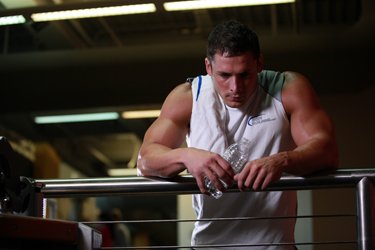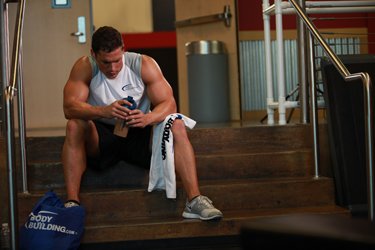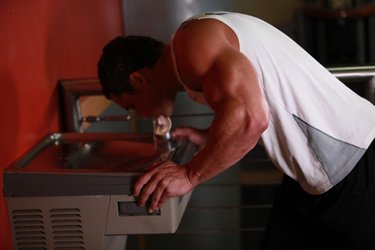>Thirst. Dry mouth. Parched. We know what this feels like, because most of us have been there; especially if you're an avid weight trainer. Your lips start to curl in. Your tongue tastes funny.
Your breath may smell a little funky. And if you weigh yourself after a workout, chances are, you've lost 2-5% of your bodyweight. These are just a few of the side effects of dehydration, you will learn more through the course of the rest of the article, but if any of those symptoms sound familiar, I would read on.
Dehydration can affect your training, dieting and overall health. NOW do I have your attention?
Why We Need To Keep Hydrated?
The majority of the body is made up of water, with up to 75% of the body's weight due to H2O. Most of the water is found within the cells of the body (intracellular space). The rest is found in the so-called extracellular space, which consists of the blood vessels (intravascular space) and the spaces between cells (interstitial space).
Essentially, water makes the world go 'round. And by "world", I mean, "your body". It is in your blood, digestive system, and helps keep body parts lubricated. Water also helps to maintain the temperature of the human body, i.e. when the body starts to overheat, we sweat to cool ourselves down.
If you are not hydrated enough, and your pores can't excrete the necessarily water/toxins in order to help you sweat (especially when you're working out), then you risk a build up of toxins in your body, and experiencing moderate-severe edema (swelling). The same kind you experience if you take in a lot of salt, without drinking enough.
What Causes Dehydration?
There are many things that can cause dehydration. The most common are vomiting, diarrhea, blood loss, malnutrition, and plain old failure to replenish liquids lost from sweating and urination (not drinking enough water). This is the part the weight training individuals should pay attention to.
Sometimes we forget to bring our water bottles to the gym, and we are too lazy to walk to the water fountain. I've heard that many people don't like drinking during weight lifting because it makes them feel 'heavy'. Whatever the reason, some of us don't drink during our sessions. And this is a big, FAT 'no-no'.

 Click Image To Enlarge.
Click Image To Enlarge. Many People Don't Like Drinking During Weight
Lifting Because It Makes Them Feel 'Heavy'.
As I mentioned earlier, removing toxins from the body through sweat is important while working out. You really don't want to play games with this, especially if you really value your health and training.
Many illnesses and diseases can trigger acute dehydration due to the increased body temperature and sweating that usually occur. This is why your doctor tells you to drink plenty of fluids when you are ill. Your body uses fluids to expel toxins as well as to keep your system flexible, lubricated and running smoothly, thus helping to flush the 'sickness' out of your system.
I should also mention that there are several causes of dehydration, and dehydration itself causes heat stroke. According to the University of Maryland Medical Centre, heat stroke is, "the most severe form of heat illness and is a life-threatening emergency. It is the result of long, extreme exposure to the sun, in which a person does not sweat enough to lower body temperature."
Our bodies produce a tremendous amount of internal heat and we normally cool ourselves by sweating and radiating heat through the skin. However, in certain circumstances, such as extreme heat, high humidity or vigorous activity in the hot sun, this cooling system may begin to fail, allowing heat to build up to dangerous levels.
If a person becomes dehydrated and can not sweat enough to cool their body, their internal temperature may rise to dangerously high levels, causing heat stroke. This is why, when in the sun, you should make sure to drink even more than when indoors.
How Do You Know If You're Dehydrated?
There are three stages of dehydration: The initial stage, the serious stage, and the severe/possibly fatal stage. They progress in terms of severity.
Initial
The body has lost about 2% of its total fluid. These mild dehydration symptoms are often (but not limited to):
- Thirst
- Loss of appetite
- Dry skin
- Skin flushing
- Dark Colored Urine
- Dry mouth
- Fatigue or weakness
- Chills
- Head rushes

 Click Image To Enlarge.
Click Image To Enlarge. At The First Stage Of Dehydration, Body
Has Lost About 2% Of Its Total Fluid.
Serious
Total fluid loss reaches 5%. The following effects of dehydration are normally experienced:
- Increased heart rate
- Increased respiration
- Decreased sweating
- Decreased urination
- Increased body temperature
- Extreme fatigue
- Muscle cramps
- Headaches
- Nausea
- Tingling of the limbs
Severe
Total fluid loss reaches 10%. The following effects of dehydration are normally experienced, and emergency help is needed immediately!
- Muscle spasms
- Vomiting
- Racing pulse
- Shriveled skin
- Dim vision
- Painful urination
- Confusion
- Difficulty breathing
- Seizures
- Chest and abdominal pain
- Unconsciousness
What To Do About Dehydration?
The average person looses between two and three liters of water a day through the breath, sweat, and urine. To prevent dehydration you simply need to replenish the liquids that are lost throughout the day. It's as easy as that.
However, heavy exercise can cause a body to loose more than 2 liters an hour! So, make sure that you drink at least anywhere from 1-1.5 liters of water for every hour of exercises. A common saying is that "if you feel thirsty, you're already dehydrated". So keep a water bottle on you at all times, especially when you are exercising.
However, I want to mention hyponatremia. It's an electrolyte disturbance/imbalance, resulting from a problem with the sodium-potassium balance in your body. It is usually caused by over-hydration. Many marathon runners (and a woman on a DJ radio call-in show) have passed away from drinking too much water, which caused brain swelling.
I don't mean to scare you, but I want you to know that drinking too much is just as bad as drinking not enough. So be sure to balance your input carefully. A good rule of thumb is that when your urine is clear by the end of the day, you have adequately hydrated yourself. If it is still dark yellow, you still have more drinking to do.
I also want to emphasize that although people used to say that coffee and sodas don't count because they contain caffeine (which is a known diuretic), this myth has recently been disproven. Any liquid is a good liquid to drink, assuming you are one of those people that dislikes the 'taste' of water.
One of the best solutions would be to use an oral rehydration solution. Unless your doctor advises otherwise, use an oral rehydration solution such as Pedialyte for infants and children who have diarrhea, vomiting or fever. These solutions contain water and salts in specific proportions to replenish both fluids and electrolytes.
For adolescents and adults, something like Gatorade or Powerade would be appropriate after a workout. These too, contain adequate concentrations of fluids and electrolytes. Try and have something with salt in it, as salt will help with the water retention (keeping water in your body).
References:
- http://www.umm.edu/non_trauma/dehyrat.htm
- http://www.medicinenet.com/dehydration/article.htm
- http://www.symptomsofdehydration.com/

